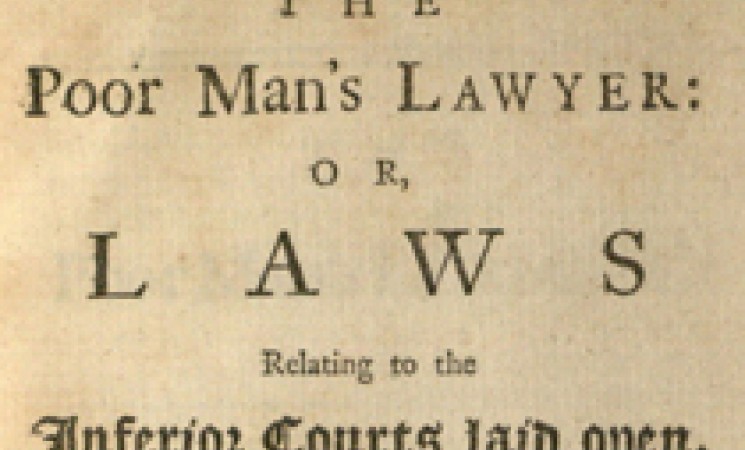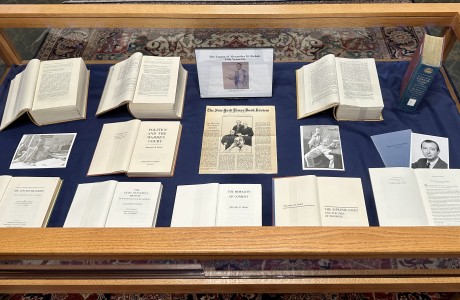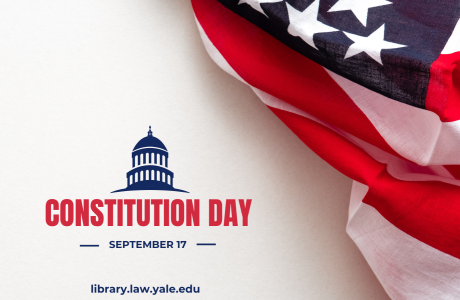New exhibit: "350 Years of Rebellious Lawyering"

In conjunction with the 20th Annual Rebellious Lawyering Conference at the Yale Law School, the Law Library’s Rare Book Collection has a new exhibit, “350 Years of Rebellious Lawyering,” showcasing nine historic examples of public interest lawyering.

William Leach. The bribe-takers of jury-men partiall, dishonest, and ignorant discovered and abolished; and, honest, judicious, able, and impartiall restored. London, 1652.
“Leach brought his experience as a common attorney, as well as a defendant, to the public discussion of legal reform that followed the execution of Charles I in 1649. … In The Bribe-Takers of Jury-Men (1652) he complained that the fall in money values allowed such disreputable types as ‘needy alehouse-keepers’, who were subject to pressure from their bailiff customers, to sit on lower court juries.” – Oxford Dictionary of National Biography

Thomas Pearce. The poor man’s lawyer, or, Laws relating to the inferior courts laid open. London, 1755.
“Therefore Gaolers are the Oppressors of the People; and their Fees are Extortion; and that Thief-Catchers, Hussars and Pandours, are a Confederacy of wicked People, chiefly designed to entrap poor unwary People; and are the chief Causes of Hurrying poor abandoned Wretches into their Wiles and Contrivances.” – page 71.

Karl von Eckartshausen (1752-1803). Handbuch für Kriminalrichter. Munich, 1792.
“The present work deals with historical jurisprudence (early legislation of the ancients as well as Germans and the English) and criminology; included are the theories of Beccaria and von Soden. There is a section dealing with the bad state of prisons.” – Jeffrey D. Mancevice, Inc., August 2008 List, no. 20.

Francesco Mario Pagano (1748-1799). Considerazioni di Francesco Mario Pagano sul processo criminale. Milan, 1801.
“Following on from Beccaria and Montesquieu, Pagano was convinced that by means of a reform of penal law existing social and political structures could be changed, if there was enough will for reform. Pagano was one of the most active and influential members of the republican government in Naples in 1799. With the return of the Bourbons he was arrested and executed, despite the guarantees given to the Republicans in the capitulation agreement.” – Susanne Schulz-Falster Rare Books (April 2010)

Argument of William H. Seward in defence of William Freeman, on his trial for murder. Auburn, N.Y., 1846.
Freeman, an African American, murdered an entire family with an axe. “His trial, and particularly his defense by former Governor William H. Seward, aroused great excitement because of the plea of insanity. … The case did much to insure a better hearing for the insane who, until then, received small consideration in the courts.” (McDade, Annals of Murder).

Boston slave riot, and trial of Anthony Burns. Boston, 1854.
“The trial and rendition of Anthony Burns was one of the most dramatic and famous incidents in the enforcement of the Fugitive Slave Act” (Finkelman, Slavery in the Courtroom). Several of Boston’s leading lawyers, including Richard Henry Dana, argued unsuccessfully for Burns’ release. After a disastrous attempt to rescue Burns, he was sent back to slavery under heavy military guard.

Argument of Clarence Darrow in the case of the Communist Labor Party in the Criminal Court, Chicago. Chicago, 1920.
“I am interested in the verdict of this jury as to whether this country shall be ruled by the conscienceless men who would stifle freedom of speech when it interferes with their gold; or whether this jury will stand by the principles of the fathers and, whether so far as you can, you will stop this mad wave that threatens to engulf the liberty of the American citizens.” – page 11

Governor Young: pardon Tom Mooney-innocent. San Francisco, 1930.
Tom Mooney (1882-1942), a militant labor organizer, and his colleague Warren Billings were framed on murder charges in 1916. Their death sentences were commuted to life in prison. This pamphlet is part of the decades-long campaign to win their release, which resulted in Mooney’s pardon in 1938. The Law Library has close to 30 items on the Mooney case.

Legal Self-Defense Group. Mr. Natural in Bailed out. Boston, 1971?
“Drawn in the style of Robert Crumb, and featuring his character ‘Mr. Natural,’ but signed ‘by a Follower of R. Crumb.’ The Legal Defense Group appears to have been a section of the Massachusetts Lawyers Guild, a left -wing legal consortium devoted to civil liberties.” – Lorne Bair Rare Books, Catalog 12, no. 94
“350 Years of Rebellious Lawyering” was curated by Mike Widener, Rare Book Librarian, and Ryan Greenwood, the 2013/14 Yale Law Library Rare Book Fellow. The exhibit is open to the public, 9am-10pm daily, February 20 - April 30, 2014, on Level L2 in the Lillian Goldman Law Library, Yale Law School.


